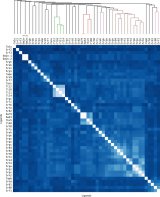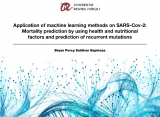Displaying from 1 to 10 of 31 available piece of news
-

A new article published about the mutation coldspots in SARS-CoV-2 M-pro
Garcia-Segura P, Llop-Peiró A, Novau-Ferré N, Mestres-Truyol J, Saldivar-Espinoza B, Pujadas G, Garcia-Vallvé S. SARS-CoV-2 main protease (M-pro) mutational profiling: An insight into mutation coldspots. Comput Biol Med. 2024 Nov 11;184:109344. doi: 10.1016/j.compbiomed.2024.109344.
-

A new article of our group published at Drug Discovery Today
Llop-Peiró A, Macip G, Garcia-Vallvé S, Pujadas G. Are protein-ligand docking programs good enough to predict experimental poses of noncovalent ligands bound to the SARS-CoV-2 main protease? Drug Discov Today. 2024 Oct;29(10):104137. doi: 10.1016/j.drudis.2024.104137.
-

A new PhD thesis defended in our research group
-

A new opinion article about the challenges in distinguishing functional proteins from polyproteins in databases
This opinion article addresses a major issue in molecular biology and drug discovery by highlighting the complications that arise from combining polyproteins and their functional products within the same database entry. This problem, exemplified by the discovery of novel inhibitors for the severe acute respiratory syndrome coronavirus 2 (SARS-CoV-2) main protease, has an influence on our ability to retrieve precise data and hinders the development of targeted therapies. It also emphasizes the need for improved database practices and underscores their significance in advancing scientific research. Furthermore, it emphasizes the need of learning from the SARS-CoV-2 pandemic in order to improve global preparedness for future health crises.
-

A new article about The Mutational Landscape of SARS-CoV-2.
-

A new PhD Thesis
Guillem Macip Sancho defended his PhD thesis entitled “Studying the limits of protein-ligand docking to predict new non-covalent inhibitors for the SARS-CoV-2 main protease” last 15th of May 2023 at the Faculty of Chemistry. Congratulations Guillem.
-

Prediction of Recurrent Mutations in SARS-CoV-2 Using Artificial Neural Networks
We show that it is possible to predict the recurrent mutations (RM) of SARS-CoV-2.
-

Could nucleocapsid be a next-generation COVID-19 vaccine candidate?
Saldivar-Espinoza B, Macip G, Pujadas G, Garcia-Vallve S. Could nucleocapsid be a next-generation COVID-19 vaccine candidate? Int J Infect Dis. 2022 Nov 5;125:231-232. doi: 10.1016/j.ijid.2022.11.002.
-

A Review of the Current Landscape of SARS-CoV-2 Main Protease Inhibitors: Have We Hit the Bullseye Yet?
Macip, G.; Garcia-Segura, P.; Mestres-Truyol, J.; Saldivar-Espinoza, B.; Pujadas, G.; Garcia-Vallvé, S. A Review of the Current Landscape of SARS-CoV-2 Main Protease Inhibitors: Have We Hit the Bullseye Yet? Int. J. Mol. Sci. 2022, 23, 259. https://doi.org/10.3390/ijms23010259
-

Haste makes waste: A critical review of docking-based virtual screening in drug repurposing for SARS-CoV-2 main protease (M-pro) inhibition
Macip G, Garcia-Segura P, Mestres-Truyol J, Saldivar-Espinoza B, Ojeda-Montes MJ, Gimeno A, Cereto-Massagué A, Garcia-Vallvé S, Pujadas G. Haste makes waste: A critical review of docking-based virtual screening in drug repurposing for SARS-CoV-2 main protease (M-pro) inhibition. Med Res Rev. 2021 Oct 26. doi: 10.1002/med.21862. PMID: 34697818.
